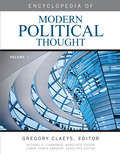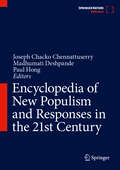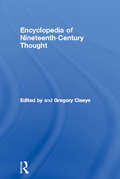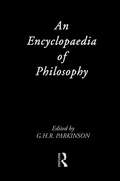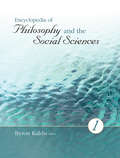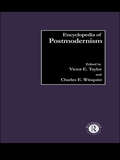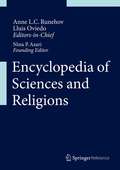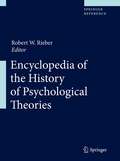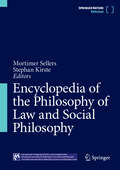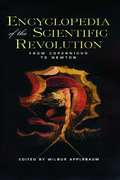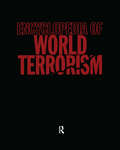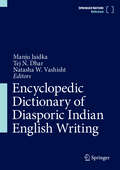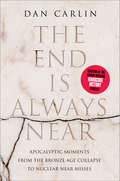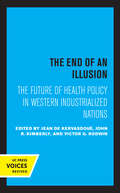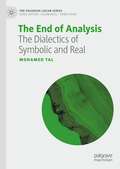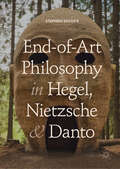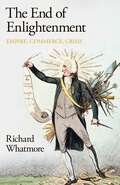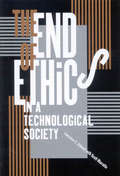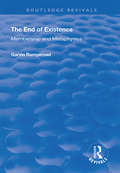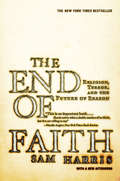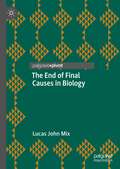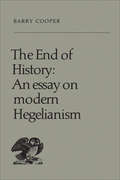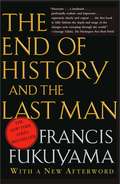- Table View
- List View
Encyclopedia of Modern Political Thought (set)
by Gregory ClaeysThis groundbreaking new work explores modern and contemporary political thought since 1750, looking at the thinkers, concepts, debates, issues, and national traditions that have shaped political thought from the Enlightenment to post-modernism and post-structuralism. Encyclopedia of Modern Political Thought is two-volume A to Z reference that provides historical context to the philosophical issues and debates that have shaped attitudes toward democracy, citizenship, rights, property, duties, justice, equality, community, law, power, gender, race, and legitimacy over the last three centuries. It profiles major and minor political thinkers, and the national traditions, both Western and non-Western, which continue to shape and divide political thought. More than 200 scholars from leading international research institutions and organizations have provided signed entries that offer comprehensive coverage of: Thought of regions and countries, including African political thought, American political thought , Australasian political thought (Australian and New Zealand), Chinese political thought, Indian political thought, Islamic political Thought, Japanese political thought, and more Thought regarding contemporary issues such as abortion, affirmative action, animal rights, European integration, feminism, humanitarian intervention, international law, race and racism, and more The ideological spectrum from Marxism to neoconservatism, including anarchism, conservatism, Darwinism and Social Darwinism, Engels, fascism, the Frankfurt School, Lenin and Leninism, socialism, and more Connections of political thought to key areas of politics and other disciplines such as economics, psychology, law, and religion Notable time periods of political thought since 1750 Concepts including class, democratic theory, liberalism, nationalism, natural and human rights, and theories of the state Theorists and political intellectuals, both Western and non-Western including John Adams, Edmund Burke, Mohandas Gandhi, Immanuel Kant, Ayatollah Khomeini, Ernst Friedrich Schumacher, George Washington, and Mary Wollstonecraft
Encyclopedia of Modern Political Thought (set)
by Gregory ClaeysThis groundbreaking new work explores modern and contemporary political thought since 1750, looking at the thinkers, concepts, debates, issues, and national traditions that have shaped political thought from the Enlightenment to post-modernism and post-structuralism. Encyclopedia of Modern Political Thought is two-volume A to Z reference that provides historical context to the philosophical issues and debates that have shaped attitudes toward democracy, citizenship, rights, property, duties, justice, equality, community, law, power, gender, race, and legitimacy over the last three centuries. It profiles major and minor political thinkers, and the national traditions, both Western and non-Western, which continue to shape and divide political thought. More than 200 scholars from leading international research institutions and organizations have provided signed entries that offer comprehensive coverage of: Thought of regions and countries, including African political thought, American political thought , Australasian political thought (Australian and New Zealand), Chinese political thought, Indian political thought, Islamic political Thought, Japanese political thought, and more Thought regarding contemporary issues such as abortion, affirmative action, animal rights, European integration, feminism, humanitarian intervention, international law, race and racism, and more The ideological spectrum from Marxism to neoconservatism, including anarchism, conservatism, Darwinism and Social Darwinism, Engels, fascism, the Frankfurt School, Lenin and Leninism, socialism, and more Connections of political thought to key areas of politics and other disciplines such as economics, psychology, law, and religion Notable time periods of political thought since 1750 Concepts including class, democratic theory, liberalism, nationalism, natural and human rights, and theories of the state Theorists and political intellectuals, both Western and non-Western including John Adams, Edmund Burke, Mohandas Gandhi, Immanuel Kant, Ayatollah Khomeini, Ernst Friedrich Schumacher, George Washington, and Mary Wollstonecraft
Encyclopedia of New Populism and Responses in the 21st Century
by Joseph Chacko Chennattuserry Madhumati Deshpande Paul HongThis book mainly seeks to explain, define and update the recurring forms of populism in the 21st century. Examples used in this Introduction are limited to English speaking countries. But populism's existent expressions are ecumenically global. Like any long-lasting perennial organism it is sturdy and comes in a variety of forms adaptable to environmental changes. In political or cultural terms its expression has been neither exclusively left, center, nor right. Populism contains multitudes, dates back centuries before it was identified with its modern name. Populism has become a hot button issue in the recent times. The UK's Sunday heavy The Guardian published about 300 articles in 1998 that used the term "populism" or "populist" and by 2016 its use had skyrocketed to over 2,000. And growing. Probably the single greatest catalyst to date that injected populism into the world's Internet common discourse, that infused it into journalism right, left and centerand awakened populist political activism was the Great Recession of 2007-08 and the subsequent global deprivations it engendered. In today's world populism promises to remain and renew its intensity due to the covid-19 pandemic's deleterious effects on most nations middle and low-income groups, specially minorities. These are some reasons among many why it is time for populism to be relocated, identified and given refreshed 21st understandings. It has a shifting nature among people, events, causes that constantly demands fresh studies. It is a social and cultural phenomenon both universal and particular. In our 21st century world it is a product of our shared cultures and each our own exceptional deep culture. This Encyclopedia is unique in its composition as it includes all the major disciplines of Social Sciences and thus will be a one stop source of nine different disciplines looking at new populism.
Encyclopedia of Nineteenth Century Thought
by Gregory ClaeysEncyclopedia of Nineteenth Century Thought provides essential information on, and a critical interpretation of, nineteenth-century thought and nineteenth-century thinkers. The project takes as its temporal boundary the period 1789 to 1914. Encyclopedia of Nineteenth Century Thought primarily covers social and political thinking, but key entries also survey science, religion, law, art, concepts of modernity, the body and health, and so on, and thereby take into account all of the key developments in the intellectual history of the period. The encyclopedia is alphabetically organized, and consists of:* principal entries, divided into ideas (4000 words) and persons (2500 words)* subsidiary entries of 1000 words, which are entirely biographical* informational entries of 500 words, which are also biographical.
An Encyclopedia of Philosophy (Routledge Companion Encyclopedias)
by G.H.R. Parkinson* Presents a broad survey of philosophical thought* Each chapter explores, and places in context, a major area of philosophical enquiry - including the theory of meaning and of truth, the theory of knowledge, the philosophies of mathematics, science and metaphysics, the philosophy of mind, moral and political philosophy, aesthetics, and religion* Annotated bibliographies for each chapter and indexes of names and subjects * Glossary of commonly-used philosophical terms* Chronological table of the history of philosophy from 1600`It is a fine achievement and deserves the warmest praise ... Anyone interested in learning what contemporary philosophical debate is about will find this book invaluable ... for a book of this size and quality of content the cover price is modest. Every public library as well as every university, college and school library should have a copy on its shelves.' - Times Higher Education Supplement`A stimulating collection.' - Reference Reviews
Encyclopedia of Philosophy and the Social Sciences
by Byron Kaldis"This encyclopedia, magnificently edited by Byron Kaldis, will become a valuable source both of reference and inspiration for all those who are interested in the interrelation between philosophy and the many facets of the social sciences. A must read for every student of the humanities." Wulf Gaertner, University of Osnabrueck, Germany "Like all good works of reference this Encyclopedia of Philosophy and the Social Sciences is not to be treated passively: it provides clear and sometimes controversial material for constructive confrontation. It is a rich resource for critical engagement. The Encyclopedia conceived and edited by Byron Kaldis is a work of impressive scope and I am delighted to have it on my bookshelf.” David Bloor, Edinburgh University "This splendid and possibly unique work steers a skilful course between narrower conceptions of philosophy and the social sciences. It will be an invaluable resource for students and researchers in either or both fields, and to anyone working on the interrelations between them." William Outhwaite, Newcastle University The Encyclopedia of Philosophy and the Social Sciences is the first of its kind in bringing the subjects of philosophy and the social sciences together. It is not only about the philosophy of the social sciences but, going beyond that, it is also about the relationship between philosophy and the social sciences. The subject of the Encyclopedia is purposefully multi- and inter-disciplinary. Knowledge boundaries are both delineated and crossed over. The goal is to convey a clear sense of how philosophy looks at the social sciences and to mark out a detailed picture of how the two are interrelated: interwoven at certain times but also differentiated and contrasted at others. The Entries cover topics of central significance but also those that are both controversial and on the cutting-edge, underlining the unique mark of this Encyclopedia: the interrelationship between philosophy and the social sciences, especially as it is found in fresh ideas and unprecedented hybrid disciplinary areas. The Encyclopedia serves a further dual purpose: it contributes to the renewal of the philosophy of the social sciences and helps to promote novel modes of thinking about some of its classic problems.
Encyclopedia of Postmodernism
by Victor E. Taylor Charles E. WinquistThe Encyclopedia of Postmodernism provides comprehensive and authoritative coverage of academic disciplines, critical terms and central figures relating to the vast field of postmodern studies. With three cross-referenced sections, the volume is easily accessible to readers with specialized research agendas and general interests in contemporary cultural, historical, literary and philosophical issues.Since its inception in the 1960s, postmodernism has emerged as a significant cultural, political and intellectual force that many scholars would argue defines our era. Postmodernism, in its various configurations, has consistently challenged concepts of selfhood, knowledge formation, aesthetics, ethics, history and politics. This Encyclopedia offers a wide-range of perspectives on postmodernism that illustrates the plurality of this critical concept that is so much part of our current intellectual debates. In this regard, the volume does not adhere to a single definition of postmodernism as much as it documents the use of the term across a variety of academic and cultural pursuits.The Encyclopedia of Postmodernism, it must be noted, resists simply presenting postmodernism as a new style among many styles occuring in the post-disciplinary academy. Documenting the use of the term acknowledges that postmodernism has a much deeper and long-lasting effect on academic and cultural life. In general, the volume rests on the understanding that postmodernism is not so much a style as it is an on-going process, a process of both disintegration and reformation.
Encyclopedia of Sciences and Religions
by Anne Runehov Lluis OviedoThe Encyclopedia of Sciences and Religions will map the (self-)identities of current and prospective participants in a scholarly area 'Science and Religion' - i.e., all academic disciplines, religious traditions, across all cultures - by implicitly drawing out from each how it sees itself in relation to the conceptual domains of 'Science' and 'Religion', how each, within its own disciplinary/tradition bounds, treats a set of key issues/themes/concepts that have thus far emerged as central to the area 'Science and Religion', and also additional issues/themes/concepts that are seen to be of relevance to 'Science and Religion' engagement as seen from the perspective of each potential participant therein. Special entries will be devoted to key thinkers and key concepts in the field. The Encyclopedia will provide not only a comprehensive, up-to-date picture of how a so-called 'Science and Religion' discourse/dialogue has thus far been treated, but as well, a starting point for new lines of inquiry, and an invitation for fresh perspectives on the possibilities for engagement between and across sciences and religions.
Encyclopedia of the History of Psychological Theories
by Robert W. RieberThis work will survey the entire range of thinking in psychology, from ancient times to the present, encompassing philosophies and theories of mind that pre-date our modern conception of psychology as a science, and extending to the current findings of neuroscience. It will set the theories into their historical context and cross-reference key influences, such as Darwin's on Freud. Fifteen hundred entries will comprise key figures, theoretical concepts, false theories, historical events, and seminal writings. International in scope, this project will involve history of psychology experts from around the world and the coverage of topics will be set in global context. The aim will be to provide a reference work of more depth than discussions that are currently available in textbooks, with the ability to connect to a multitude of relevant topics. This work will provide a picture of psychology as it has emerged into the present time and position it among other related fields such as anthropology, sociology, philosophy, and medicine.
Encyclopedia of the Philosophy of Law and Social Philosophy: Volume 3: From Ross To Dworkin And Beyond (Studies In The History Of Law And Justice Ser. #24)
by Mortimer Sellers Stephan KirsteThis encyclopedia covers all topics in the philosophy of law and social philosophy, including the history, theory, and leading theorists in both fields. Featuring specially commissioned entries by an international team of the world's most respected scholars, including more than 700 entries ensuring its place as the definitive reference work on the Philosophy of Law and Social Philosophy.The encyclopedia provides: 1) a clear concise expert definition and explanation of the key concepts in the field, written by leading scholars; 2) an essential reference for experts and newcomers alike, with entries ranging from short definitions of key terms to extended explorations of major topics; 3) an investigation of questions that have traditionally defined the field, but also more recent developments, significantly updating the fields of the philosophy of law and social philosophy; 4) introductions to theories and research developed in all the world's languages and legal traditions.
Encyclopedia of the Scientific Revolution: From Copernicus to Newton
by Wilbur ApplebaumWith unprecedented current coverage of the profound changes in the nature and practice of science in sixteenth- and seventeenth-century Europe, this comprehensive reference work addresses the individuals, ideas, and institutions that defined culture in the age when the modern perception of nature, of the universe, and of our place in it is said to have emerged. Covering the historiography of the period, discussions of the Scientific Revolution's impact on its contemporaneous disciplines, and in-depth analyses of the importance of historical context to major developments in the sciences, The Encyclopedia of the Scientific Revolution is an indispensible resource for students and researchers in the history and philosophy of science.
Encyclopedia of World Terrorism
by Martha Crenshaw John PimlottThis three-volume reference on terrorism in the 20th century places this growing phenomenon in the context of modern history. It provides students with both detailed information and the historical perspective tie terrorism to the high school and college curriculum. "Volume 1" defines terrorism, explores the historical perspective from the dawn of Western Civilisation through World War II, and discusses specific activities of modern terrorist groups. "Volume 2" focuses on the developing world, with emphasis on the Middle East (including the 1996 peace process). "Volume 3" explores terrorism and responses to terrorism in the developed world. This volume covers the United States, Europe, Israel, Britain, Central and South America and concludes with a chronology of major terrorist events since 1945, an A-Z listing of terrorist groups and leaders, and a select bibliography.
Encyclopedic Dictionary of Diasporic Indian English Writing
by Manju Jaidka Tej N. Dhar Natasha W. VashishtThe Handbook of Diasporic Indian Writing in English is an essential reference to Indian literature. It features alphabetical entries of Indian writers who have bridged the gap between cultures and redefined language boundaries. As the field of diasporic writing continues to expand and intersect with various branches of English and Cultural studies, it anticipates a growing market. It offers a unique and compelling perspective on the global tapestry of literature. It draws on various interdisciplinary approaches, including postcolonial theory, cultural studies, and digital humanities, to offer fresh and innovative perspectives on the literature. It is an indispensable resource for research scholars of literary studies and related disciplines, like cultural studies and postcolonial studies.
The End Is Always Near: Apocalyptic Moments, from the Bronze Age Collapse to Nuclear Near Misses
by Dan CarlinThe creator of the wildly popular award-winning podcast Hardcore History looks at some of the apocalyptic moments from the past as a way to frame the challenges of the future.Do tough times create tougher people? Can humanity handle the power of its weapons without destroying itself? Will human technology or capabilities ever peak or regress? No one knows the answers to such questions, but no one asks them in a more interesting way than Dan Carlin.In The End is Always Near, Dan Carlin looks at questions and historical events that force us to consider what sounds like fantasy; that we might suffer the same fate that all previous eras did. Will our world ever become a ruin for future archaeologists to dig up and explore? The questions themselves are both philosophical and like something out of The Twilight Zone.Combining his trademark mix of storytelling, history and weirdness Dan Carlin connects the past and future in fascinating and colorful ways. At the same time the questions he asks us to consider involve the most important issue imaginable: human survival. From the collapse of the Bronze Age to the challenges of the nuclear era the issue has hung over humanity like a persistent Sword of Damocles.Inspired by his podcast, The End is Always Near challenges the way we look at the past and ourselves. In this absorbing compendium, Carlin embarks on a whole new set of stories and major cliffhangers that will keep readers enthralled. Idiosyncratic and erudite, offbeat yet profound, The End is Always Near examines issues that are rarely presented, and makes the past immediately relevant to our very turbulent present.
The End of an Illusion: The Future of Health Policy in Western Industrialized Nations (Comparative Studies of Health Systems and Medical Care #11)
by Jean De Kervasdoue John R. Kimberly Victor G. RodwinThis title is part of UC Press's Voices Revived program, which commemorates University of California Press’s mission to seek out and cultivate the brightest minds and give them voice, reach, and impact. Drawing on a backlist dating to 1893, Voices Revived makes high-quality, peer-reviewed scholarship accessible once again using print-on-demand technology. This title was originally published in 1984.
The End of Analysis: The Dialectics of Symbolic and Real (The Palgrave Lacan Series)
by Mohamed TalThis book interrogates the “end of analysis” in psychoanalytic thought from Freud to Lacan. It demonstrates that the notions of mourning, renunciation, liquidation of transference, and traversal of fantasy cannot serve as a settlement for the castration complex (i.e., central to neurosis) but are rather prey to the castration complex itself. It shows how psychoanalysis remains incomplete as long as it has not surpassed them as fantasies sustained by psychoanalytic ideology. In other words, it argues that the analytic procedure must pull psychoanalysis out of this therapeutic tradition for it to be complete and to instigate an attempt of its renewal.The book equally revisits Freud’s and Lacan’s underpinnings in the Enlightenment project, in order to formulate the problem of transference on proper dialectical foundations—that is, the mechanism of alienation from Descartes to Hegel, Kierkegaard’s concept of anxiety, as well as the concepts of authority and value in Durkheim, Mauss, and Marx. In doing so, it provides fresh insights that will appeal to practitioners, as well as to scholars of psychoanalysis and philosophy.
End-of-Art Philosophy in Hegel, Nietzsche and Danto
by Stephen SnyderThis book examines the little understood end-of-art theses of Hegel, Nietzsche, and Danto. The end-of-art claim is often associated with the end of a certain standard of taste or skill. However, at a deeper level, it relates to a transformation in how we philosophically understand our relation to the ‘world’. Hegel, Nietzsche, and Danto each strive philosophically to overcome Cartesian dualism, redrawing the traditional lines between mind and matter. Hegel sees the overcoming of the material in the ideal, Nietzsche levels the two worlds into one, and Danto divides the world into representing and non-representing material. These attempts to overcome dualism necessitate notions of the self that differ significantly from traditional accounts; the redrawn boundaries show that art and philosophy grasp essential but different aspects of human existence. Neither perspective, however, fully grasps the duality. The appearance of art’s end occurs when one aspect is given priority: for Hegel and Danto, it is the essentialist lens of philosophy, and, in Nietzsche’s case, the transformative power of artistic creativity. Thus, the book makes the case that the end-of-art claim is avoided if a theory of art links the internal practice of artistic creation to all of art’s historical forms.
The End of Enlightenment: Empire, Commerce, Crisis
by Richard Whatmore'A brilliant and revelatory book about the history of ideas' David Runciman 'Fascinating and important' Ruth Scurr The Enlightenment is popularly seen as the Age of Reason, a key moment in human history when ideals such as freedom, progress, natural rights and constitutional government prevailed. In this radical re-evaluation, historian Richard Whatmore shows why, for many at its centre, the Enlightenment was a profound failure.By the early eighteenth century, hope was widespread that Enlightenment could be coupled with toleration, the progress of commerce and the end of the fanatic wars of religion that were destroying Europe. At its heart was the battle to establish and maintain liberty in free states – and the hope that absolute monarchies such as France and free states like Britain might even subsist together, equally respectful of civil liberties. Yet all of this collapsed when states pursued wealth and empire by means of war. Xenophobia was rife and liberty itself turned fanatic.The End of Enlightenment traces the changing perspectives of economists, philosophers, politicians and polemicists around the world, including figures as diverse as David Hume, Adam Smith, Edmund Burke and Mary Wollstonecraft. They had strived to replace superstition with reason, but witnessed instead terror and revolution, corruption, gross commercial excess and the continued growth of violent colonialism.Returning us to these tumultuous events and ideas, and digging deep into the thought of the men and women who defined their age, Whatmore offers a lucid exploration of disillusion and intellectual transformation, a brilliant meditation on our continued assumptions about the past, and a glimpse of the different ways our world might be structured - especially as the problems addressed at the end of Enlightenment are still with us today.
The End of Ethics in a Technological Society
by Lawrence E. Schmidt Scott MarrattoThey examine established ethical approaches to such urgent contemporary concerns as environmental degradation, nuclear energy, high tech militarism, and fetal genetic testing, showing that the prevailing viewpoint valorizes autonomy above all other goods and considers technological advances as mere extensions of the range of human freedoms. Modern ethics thus fails to take into account the moral intuition that some possibilities in the realm of techno science simply ought not to be pursued.
The End of Ethics in a Technological Society
by Lawrence E. Schmidt Scott MarrattoLawrence Schmidt and Scott Marratto challenge modern liberal ethics, arguing that there is no consistent ethical framework to deal with the long-range negative consequences of certain technological developments They examine established ethical approaches to such urgent contemporary concerns as environmental degradation, nuclear energy, high tech militarism, and fetal genetic testing, showing that the prevailing viewpoint valorizes autonomy above all other goods and considers technological advances as mere extensions of the range of human freedoms. Modern ethics thus fails to take into account the moral intuition that some possibilities in the realm of techno science simply ought not to be pursued. A comprehensive assessment of modern western society's commitment to technological progress, The End of Ethics in a Technological Society presents a convincing argument in favour of a post-liberal approach - one that rejects the ideology of progress, supports caution, and accepts limitation."
The End of Existence: Membership and Metaphysics (Routledge Revivals)
by Garvin RampersadFirst published in 1998, this volume aims to counter the paradoxes of causality and induction as presented by empirical scepticism, though the work is not a dry critique of others' efforts in this area. In order to address these issues, the author presents his instinctive belief in the interconnectedness of the world's elements from a conceptual point of view. The work is not epistemological, but metaphysical and logical, and the assumptions are made in these areas. The principal concept is "membership", which appears in logic, language and metaphysics. Truth, existence and reference are shown to be forms of membership and, as such, invalid concepts. The famous paradoxes stretch from that of the liar to Russell's result from this misconception, which is responsible for the paradoxes of causality and induction.
The End of Faith: Religion, Terror, and the Future of Reason
by Sam Harris"The End of Faith articulates the dangers and absurdities of organized religion so fiercely and so fearlessly that I felt relieved as I read it, vindicated....Harris writes what a sizable number of us think, but few are willing to say."--Natalie Angier, ?New York Times In ?The End of Faith?, Sam Harris delivers a startling analysis of the clash between reason and religion in the modern world. He offers a vivid, historical tour of our willingness to suspend reason in favor of religious beliefs--even when these beliefs inspire the worst human atrocities. While warning against the encroachment of organized religion into world politics, Harris draws on insights from neuroscience, philosophy, and Eastern mysticism to deliver a call for a truly modern foundation for ethics and spirituality that is both secular and humanistic. Winner of the 2005 PEN/Martha Albrand Award for Nonfiction.
The End of Final Causes in Biology
by Lucas John MixThis book provides a straightforward introduction to teleology in biology, the work it did and the work it can do. Informed by history and philosophy, it focuses on scientific concerns. Seventeenth, eighteenth, and nineteenth century biologists proposed a menagerie of biological “actors” to explain power without appealing to Aristotelian vegetable souls and final causes. Three constraints on teleology narrowed the field, selecting among the various actors as they mutated and recombined. Methodological naturalism, local adaptation, and blind chance each represent a significant philosophical advance in biology. Kant, Darwin, and the Modern Synthesis provided a new teleology, grounded in natural selection, an etiological recursion of form and function, and the details of carbon chemistry on Earth. They naturalized teleology, but they also finalized nature, shifting conceptions about the world and science. Understanding these links – historical, philosophical, and theoretical – sets the stage for new work moving forward.
The End of History: An Essay on Modern Hegelianism
by Barry CooperHistory ended, according to Hegel according to Kojève, with the establishment and proliferation in Europe of states organized along Napoleonic lines: rational, bureaucratic, homogenous, atheist. This state lives in some tension with the popular slogan that helped give it birth: Liberty, Equality, Fraternity. But there is now also totalitarianism – the only new kind of regime, according to Arendt, created since the national state. Man is now in charge of nature, technology, and society; much of political life has become a gavotte elaborating the meaning of the Napoleonic model.This interpretation, however opposed it seems to common sense, has been influential, particularly in France where the course of existentialism is unintelligible without taking it into account. Professor Cooper argues that it is inherently plausible and examines the arguments of Hegel and Kojève to reveal its consistency and explanatory power. And he applies it to more contemporary events – the experience of the atomic bomb, the Gulag system of extermination, and the growth of multinational corporations.The work concludes by pulling together the presuppositions and theories of the totalitarian system, the Hegelian version of the Napoleonic state, and our contemporary technological society. Overall, the reader will find here a complete and challenging presentation of how the modern world understands its collective life.
The End of History and the Last Man
by Francis FukuyamaEver since its first publication in 1992, The End of History and the Last Manhas provoked controversy and debate. Francis Fukuyama's prescient analysis of religious fundamentalism, politics, scientific progress, ethical codes, and war is as essential for a world fighting fundamentalist terrorists as it was for the end of the Cold War. Now updated with a new afterword, The End of History and the Last Man is a modern classic.
